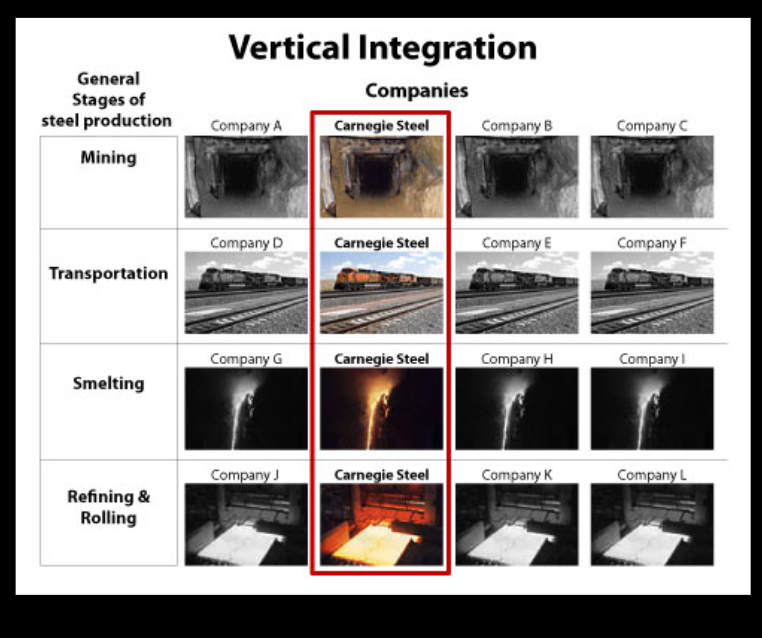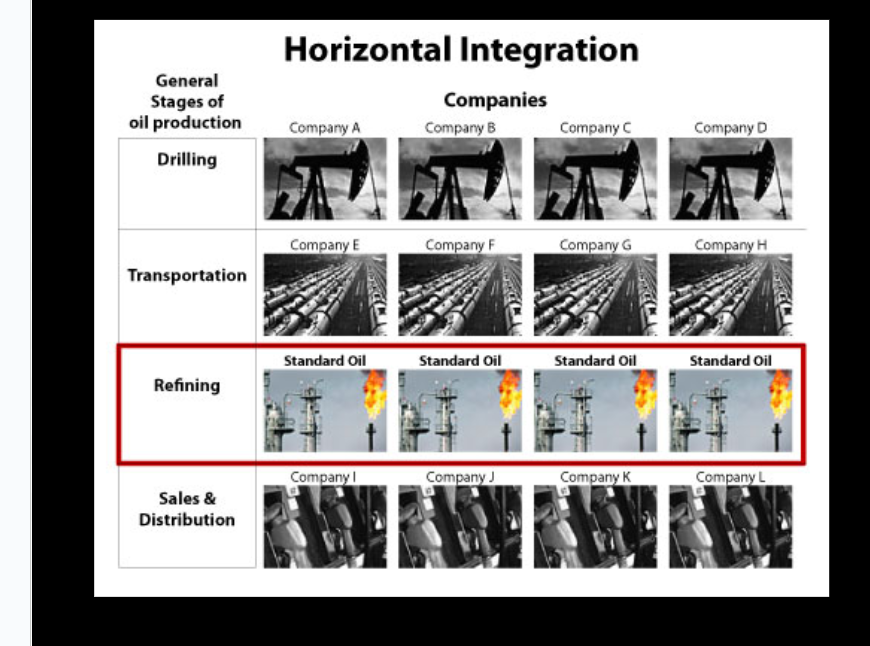Apush period 6 terms
1/59
There's no tags or description
Looks like no tags are added yet.
Name | Mastery | Learn | Test | Matching | Spaced |
|---|
No study sessions yet.
60 Terms
waving the bloody shirt
A term of ridicule used in the 1880s and 1890s to refer to politicians- especially Republicans- who, according to critics, whipped up old animosities from the Civil War era that ought to be set aside.
Tweed Ring
Boss" Tweed and his deputies ran the New York City Democratic party in the 1860s and swindled $200 million from the city through bribery, graft, and vote-buying. Boss Tweed was eventually jailed for his crimes and died behind bars.
Credit Mobilier scandal
company that overcharged Union Pacific on purpose so the stockholders could pocket the difference and give some of the money to Congressmen
purpose was to build railroad tracks at 2 or 3 times the actual price
a list of Congressmen involved was made public
panic of 1873
the first global depression brought about by industrial capitalism. It was caused by too many railroads and factories being formed than existing markets could bear and the over-loaning by banks to those projects.
Gilded Age
1870s - 1890s; time period looked good on the outside, despite the corrupt politics & growing gap between the rich & poor
Patronage
The act of giving privilege or financial encouragement to a person or organization.
Compromise of 1877
a purported informal, unwritten deal that settled the intensely disputed 1876 U.S. presidential election. It resulted in the United States federal government pulling the last troops out of the South, and formally ended the Reconstruction Era.
Civil Rights Act of 1875
guaranteed African Americans equal treatment in public accommodations, public transportation, and prohibited exclusion from jury service.
Sharecropping
A system of agriculture where a landowner allows a tenant to use the land in return for a share of the crop produced on land.
Jim Crow
racial segregation laws enacted after the Reconstruction period in Southern United States.
Plessy v. Ferguson
U.S. Supreme Court decision supporting the legality of Jim Crow laws that permitted or required separate but equal facilities for blacks and whites. "Separate but equal" Principle underlying legal racial segregation
Chinese Exclusion Act
Law that disallowed Chinese immigration - initially Chinese had been encouraged to come to the US to labor on the RR, but become a perceived economic and political source of competition
Pendleton Act
the federal legislation that created a system in which federal employees were chosen based upon competitive exams
Homestead Strike
a violent strike at the Homestead Works in Pittsburgh over a lock out follwing a decision to cut wages by nearly 20%. This strike ended with the destruction of the Amalgamated Association of Iron and Steel workers, probably the largest craft union at the time.
Grandfather clause
allowed a voter to avoid a literacy test if his father or grandfather had been eligible to vote on January 1st, 1867. This allowed illiterate white males to vote because they didn't have to pass the literacy test.
Wabash, St. Louis & Pacific Railroad Company v. Illinois- 1886
Railroad companies were highly competitive on long-haul routes, but monopolies typically controlled short-hauled connections.
Higher rates per mile for short-haul shippers than for long-haul shippers.
Illinois passed a law to prohibit rates that discriminate between short and long-haul
Wabash, St. Louis and Pacific Railway Company is found guilty of violating this law.
Did Illinois infringe upon National Commerce Powers when passing their law that ended discrimination between long and short-haul trips??
The Supreme Court ruled that yes the Illinois law is unconstitutional
The regulation of interstate railroad rates is "of a general and national character" and thus "can only appropriately exist by general rules and principles, which demand that it should be done by Congress"
this regulation is an issue of national powers and not state issues.
Interstate Commerce Act- 1887
a United States federal law that was designed to regulate the railroad industry, particularly its monopolistic practices. The Act required that railroad rates be "reasonable and just," but did not empower the government to fix specific rates.
John Rockefeller
Creator of the Standard Oil Company who made a fortune on it and joined with competing companies in trust agreements that in other words made an amazing monopoly
JP Morgan
An influential banker and businessman who bought and reorganized companies. His US Steel company would buy Carnegie steel and become the largest business in the world in 1901
Carnegie
American industrialist and philanthropist
Carnegie Steel Company, dominated the American steel industry.

Vertical integration
all steps of production are controlled by one corporation
carnegie and his steel

Horizontal integration
allying ith competitors and basically absorbing them and inevitably monopolizing the market
rockefellers gradual dominance of oil industry
Trust
A monopoly that controls goods and services, often in combinations that reduce competition.
Interlocking Directorates
executives or directors from one company serve on the Board of Directors of another company. JP Morgan introduced this practice to eliminate banking competition in the 1890s.
Standard Oil Company
the gospel of wealth
This was a book written by Carnegie that described the responsibility of the rich to be philanthropists. This softened the harshness of Social Darwinism as well as promoted the idea of philanthropy.
Social Darwinism
The application of ideas about evolution and "survival of the fittest" to human societies - particularly as a justification for immigration and labor policies, and eventually imperialism
Sherman Antitrust Act- 1890
First federal action against monopolies, it was signed into law by Harrison and was extensively used by Theodore Roosevelt for trust-busting. However, it was initially misused against labor unions
National labor union- 1866
The first large-scale U.S. union; founded to organize skilled and unskilled laborers, farmers, and factory workers.
Knights of Labor- 1869
1st effort to create National union. Open to everyone but lawyers and bankers. Vague program, no clear goals, weak leadership and organization. Failed
Haymarket Square- 1886
strike in Chicago that turned violent killing 8 policemen and a number of civilians; Workers were striking for an 8 hour work day and better working conditions
American Federation of Labor
1886; founded by Samuel Gompers; sought better wages, hrs, working conditions; skilled laborers, arose out of dissatisfaction with the Knights of Labor, rejected socialist and communist ideas, non-violent.
Closed shop
A union-organizing term that refers to the practice of allowing only unionized employees to work for a particular company
New Immigrants
Immigrants who came to the United States during and after the 1880s; most were from southern and eastern Europe.
Settlement Houses
a house where immigrants came to live upon entering the U.S
At Settlement Houses, instruction was given in English and how to get a job, among other things.
Hull House, chicago: 1st settlement house opened by Jane Addams in Chicago in 1889.
focused on the needs of families
Liberal Protestants
embers of a branch of Protestantism that flourished from 1875 to 1925 and encouraged followers to use the Bible as a moral compass rather than to believe that the Bible represented scientific or historical truth.
Tuskegee Institute
A normal and industrial school led by Booker T. Washington in Tuskegee, Alabama. It focused on training young black students in agriculture and the trades to help them achieve economic independence
Land-Grant Colleges
funded by and given to states by the government. The land was then sold to start a university. Land-grant colleges were created in response to the Industrial Revolution, and aimed to increase states' ability to teach agriculture, science, and engineering.
Pragmatism
thinking of or dealing with problems in a practical way, rather than by using theory or abstract principles.
Yellow journalism
Journalism that exploits, distorts, or exaggerates the news to create sensations and attract readers
United States newspaper publisher who owned the new york journal and was know for his introduction of large headlines and sensational reporting
National American Woman
Suffrage Association (NAWSA)
An organization founded in 1890 to demand the vote for women. NAWSA argued that women should be allowed to vote because their responsibilities in the home and family made them indispensable in the public decision-making process.
Women’s Christian
Temperance Union (WCTU)
Women's organization founded by reformer Frances Willard and others to oppose alcohol consumption.
Realism
A style of writing developed in the 19th century that attempts to depict life accurately without idealizing or romanticizing it.
Naturalism
a literary movement from the 1880s-1940s that used extreme realism to suggest that social conditions, heredity, and environment shape human character and there was no way to escape it.
Regionalism
Unique characteristics of areas and honest portrayals of people
City Beautiful movement
make cities more beautiful in order to improve people's lives - but not to make housing affordable. - therefore, the support for city beautiful movement came from wealthy industrialists & businessmen = proof of American industrial capitalism.
Reservation system
The system that allotted land with designated boundaries to Native American tribes in the west, beginning in the 1850s and ending with the Dawes Severalty Act of 1887. Within these reservations, most land was used communally, rather than owned individually.
Battle of the Little Bighorn- 1876
an engagement between the combined forces of the Lakota and Northern Cheyenne tribes against the 7th Cavalry of the United States Army.
Battle of Wounded Knee- 1890
a massacre in 1890 that started when Sioux left the reservation in protest because of the death of Sitting Bull
Dawes Severalty Act- 1887
The act authorized the president to confiscate and redistribute tribal lands in the American West.
Homestead Act- 1862
permitted any citizen or prospective citizen to claim 160 acres of public land and to purchase it for a small fee after living on it for five years.
Populists- 1891 ish
A political philosophy supporting the rights and power of the people in their struggle against the privileged upper class; increased farmers' political power and to work for legislation in their interest.
The ideology that the common people have the capability and power to have control over their government. SIGNIFICANCE: Gave the common people a voice.
Pullman Strike - 1894
a nonviolent strike which brought about a shut down of western railroads, which took place against the Pullman Palace Car Company in Chicago because of the poor wages of the Pullman workers.
Fourth party system
the pressure on America to be a global power economically specifically during WWI and the progressive era. The Northeast business supported the Republicans and the South/West business supported the Democrats. Immigrants were won over by both parties.
Gold Standard Act- 1900
This was signed by McKinley. It stated that all paper money would be backed only by gold. This meant that the government had to hold gold in reserve in case people decided they wanted to trade in their money.
Laissez-faire
allowing industry to be free of state intervention, especially restrictions in the form of tariffs and government monopolies.
ocala platform- 1890
created by delegates of the National Alliance in which they supported: direct elections/low tariff rates/graduated income tax/new banking system. Also demanded that Treasury notes/silver be used to increase money circulation & federal storage.
Munn v. Illinois. 1877
The Supreme Court upheld the Granger laws. The Munn case allowed states to regulate certain businesses within their borders, including railroads, and is commonly regarded as a milestone in the growth of federal government regulation.
granger laws
an organization of farmers, called the Grange, strove to regulate railway rates and storage fees charged by railroads, warehouses, and grain elevators through state legislation.